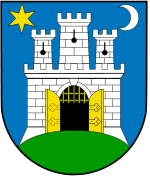Art Pavilion, Zagreb
| Umjetnički paviljon u Zagrebu | |
|
Front entrance to the Pavilion, as seen from King Tomislav Square | |
| Established | 15 December 1898 |
|---|---|
| Location | 22 King Tomislav Square, Zagreb |
| Coordinates | 45°48′26″N 15°58′43″E / 45.80722°N 15.97861°ECoordinates: 45°48′26″N 15°58′43″E / 45.80722°N 15.97861°E |
| Type | Art gallery |
| Director | Radovan Vuković |
| Curator | Stanko Špoljarić |
| Website | umjetnicki-paviljon.hr |

The Art Pavilion in Zagreb (Croatian: Umjetnički paviljon u Zagrebu) is an art gallery in Zagreb, Croatia. The Pavilion is located in the Lower Town area of the city, south of Nikola Šubić Zrinski Square and just north of the King Tomislav Square with the Zagreb Central Station. Established in 1898, it is the oldest gallery in the Southeast Europe and the only purpose-built gallery in Zagreb designed specifically to accommodate large scale exhibitions.[1]
History
The idea of creating the gallery was first put forward by Croatian painter Vlaho Bukovac in the spring of 1895.[2] In May 1896 a Millennium Exhibition was to be held in Budapest, celebrating 1,000 years of Hungarian statehood, and artists from what was then Kingdom of Croatia-Slavonia were invited to attend. Urged by Bukovac, Croatian artists decided to present their works in a purpose-built Pavilion, constructed around a prefabricated iron skeleton so that it could easily be shipped to Zagreb after the exhibition.[2] The Budapest Pavilion was designed by Hungarian architects Flóris Korb and Kálmán Giergl and was constructed by the Danubius building company.[1]
After the exhibition had ended, the building's skeleton was transported to Zagreb and Austrian architects Fellner & Helmer (who were at the time active in Zagreb, and had earlier designed the Croatian National Theatre building) were hired to design a new version of the building based on the iron skeleton, while the Hönigsberg & Deutsch building company was contracted to perform the actual construction.[1] The building's exterior was decorated with sculptures in the academic art style — the eastern facade displays busts of three Renaissance painters of Croatian ancestry — Giulio Clovio (Julije Klović), Andrea Schiavone (Andrija Medulić) and Vittore Carpaccio, and the western facade has busts of Michelangelo, Raphael and Titian.[2]
The construction went on for two years between 1897 and 1898 and the Pavilion was officially inaugurated on 15 December 1898 with a large exhibition showcasing works of local artists called Croatian Salon (Croatian: Hrvatski salon).[2] The exhibition was very popular and attracted some 10,000 visitors, at a time when Zagreb had a total population of 60,000.[3]
The gallery has a total display area of 600 m2 and does not have a permanent display as it specialises in one-off solo and group exhibitions representing notable oeuvres and art movements from all periods and styles, with works by both Croatian and foreign artists. Throughout its history the gallery organised around 700 exhibitions with artists ranging from the Earth Group collective to George Grosz, Henry Moore, Auguste Rodin, Andy Warhol, Mimmo Rotella and many others.[3] Since 2005 every year around the time of the anniversary of the Pavilion's foundation it publishes a CD-ROM with a virtual tour of exhibitions held in the past year.[3]
In recent years it featured retrospective exhibitions of artists such as Milivoj Uzelac,[4] Gilles Aillaud,[5] Edo Kovačević,[6] and Gerhard Richter,[7] and group exhibitions which featured works of contemporary artists such as Santiago Sierra and Boris Mikhailov,[8] as well as 19th-century artists such as Karl von Piloty, Nikolaos Gyzis, Gabriel von Max and Franz Stuck.[9]
In 2006, the glass roof of the Pavilion was renovated and the lighting system was replaced,.[10] The renovation works continued for seven years and were completed in 2013.[11]
References
- 1 2 3 "The history and activities of the Art pavilion in Zagreb 1898. - 1998.". Art Pavilion in Zagreb. Retrieved 16 March 2010.
- 1 2 3 4 Knežević, Snješka (1996). Zagrebačka zelena potkova (in Croatian). Zagreb: Školska knjiga. pp. 149–160. ISBN 953-0-60524-2.
- 1 2 3 "Dan Umjetničkog paviljona 15. prosinca 2008. i 110. godišnjica njegova postojanja" (in Croatian). Art pavilion in Zagreb. Retrieved 16 March 2010.
- ↑ "Milivoj Uzelac, 1897 - 1977 - Retrospective". Art Pavilion in Zagreb. Retrieved 16 March 2010.
- ↑ "Gilles Aillaud: From Picture to Stage". Art Pavilion in Zagreb. Retrieved 16 March 2010.
- ↑ "Edo Kovačević — Retrospective". Art Pavilion in Zagreb. Retrieved 16 March 2010.
- ↑ "Gerhard Richter — Survey". Art Pavilion in Zagreb. Retrieved 16 March 2010.
- ↑ "Looking at Others — photographs and video installations". Art Pavilion in Zagreb. Retrieved 16 March 2010.
- ↑ "ZAGREB — MÜNCHEN: Hrvatsko slikarstvo i Akademija likovnih umjetnosti u Münchenu" (in Croatian). Art Pavilion in Zagreb. Retrieved 16 March 2010.
- ↑ Nezirović, Vanja (25 July 2006). "Za obnovu Umjetničkog paviljona 8,4 milijuna kuna" (in Croatian). Jutarnji list. Retrieved 16 March 2010.
- ↑ "Obnovljen Umjetnički paviljon". zagreb.hr (in Croatian). City of Zagreb. 16 May 2013. Retrieved 7 November 2016.
External links
| Wikimedia Commons has media related to Art Pavilion in Zagreb. |
- Official website (Croatian) (English)
